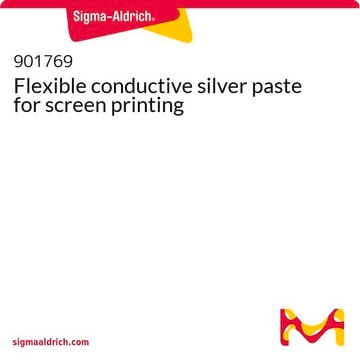200689
Ethyl cellulose
viscosity 10 cP, 5 % in toluene/ethanol 80:20(lit.), extent of labeling: 48% ethoxyl
Sinónimos:
ethylcellulose
About This Item
Productos recomendados
Formulario
powder
Nivel de calidad
temp. de autoignición
698 °F
Extensión del etiquetado
48% ethoxyl
índice de refracción
n20/D 1.47 (lit.)
viscosidad
10 cP, 5 % in toluene/ethanol 80:20(lit.)
temperatura de transición
softening point 155 °C
densidad
1.14 g/mL at 25 °C (lit.)
cadena SMILES
O1[C@H](C(C(C(C1COCC)OCC)OCC)OCC)O[C@@H]2C(OC(C(C2OCC)OCC)OCC)COCC
Clave InChI
MINRZDZESGXKDM-OLIDUAMRSA-N
¿Está buscando productos similares? Visita Guía de comparación de productos
Descripción general
Aplicación
It can be used to prepare graphene-based ink for inkjet printing. This graphene oxide ink printed onto ITO surfaces can be used as an electrode for label-free DNA sensing.
Owing to its unique features such as gastroresistance, biocompatibility, and degradation to non-toxic and readily excreted products, EC is widely used in oral and topical drug dosage forms for the controlled release of the drug.
Características y beneficios
- Non-toxic
- Stable
- Compressible
Código de clase de almacenamiento
11 - Combustible Solids
Clase de riesgo para el agua (WGK)
WGK 1
Punto de inflamabilidad (°F)
Not applicable
Punto de inflamabilidad (°C)
Not applicable
Equipo de protección personal
Eyeshields, Gloves, type N95 (US)
Elija entre una de las versiones más recientes:
¿Ya tiene este producto?
Encuentre la documentación para los productos que ha comprado recientemente en la Biblioteca de documentos.
Los clientes también vieron
Nuestro equipo de científicos tiene experiencia en todas las áreas de investigación: Ciencias de la vida, Ciencia de los materiales, Síntesis química, Cromatografía, Analítica y muchas otras.
Póngase en contacto con el Servicio técnico






